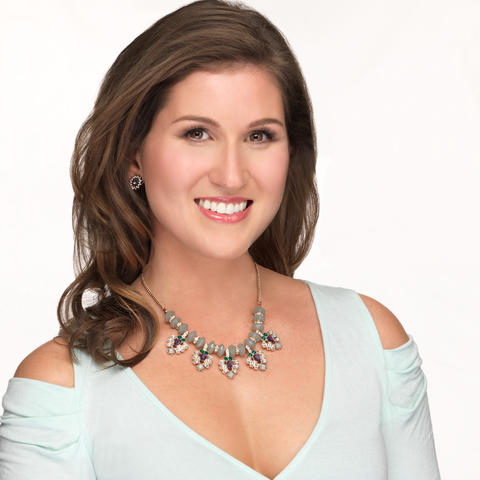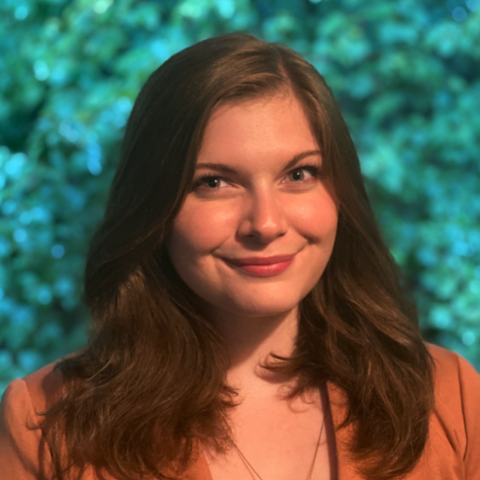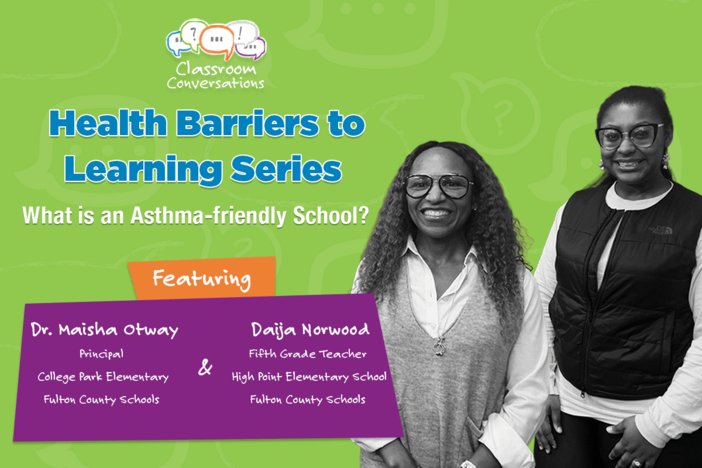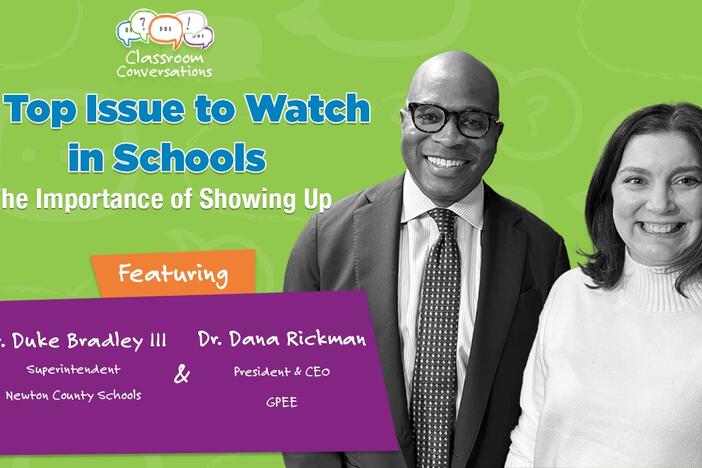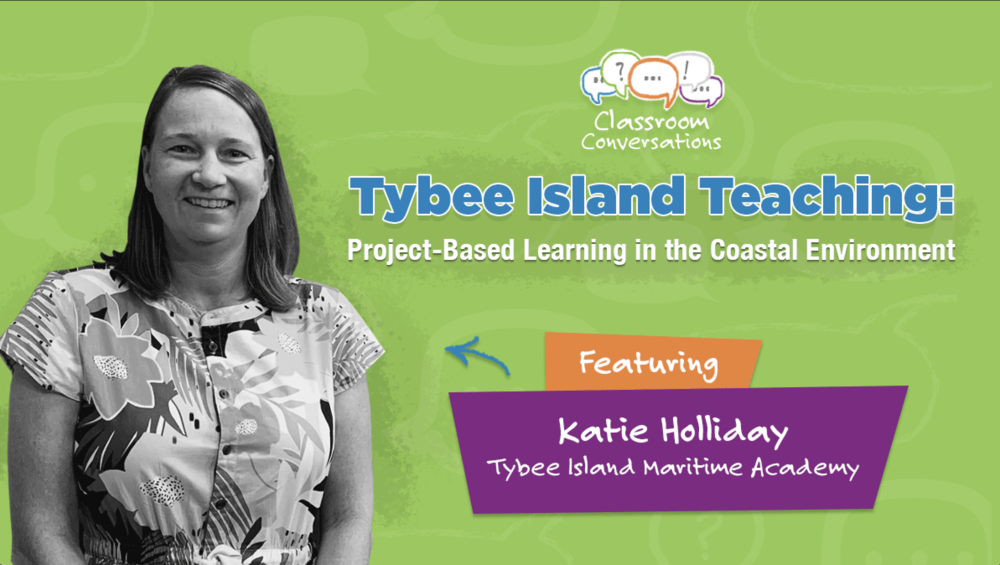
Section Branding
Header Content
Episode 205: Tybee Island Teaching: Project-Based Learning In The Coastal Environment
Primary Content
Katie Holliday joins us to share how she implements project-based learning in her Tybee Island classroom.

Katie Holliday joins us to share how she implements project-based learning in her Tybee Island classroom.
TRANSCRIPT
Ashley Mengwasser: Hello, there. I'm Ashley Mengwasser. Welcome back to Classroom Conversations. We consider this podcast the platform for Georgia's teachers. Why? Because it's 30 minutes to yourself. Just kidding. Because it's a place where educators can share and learn and we're so glad you're here. This series is presented by the Georgia Department of Education, thank you, alongside production partners, Georgia Public Broadcasting, and I am lost at sea. At least that's where I want to be. Today, the sea came to us. In this episode, you're going to hear words and locations that will transport you to a sunnier, saltier place right here in Georgia, to a science teacher's paradise Tybee Island, and someone incredibly knowledgeable just blew in to teach us about the joys and values associated with PBLs, project-based learning units, that is. My guest today does actual ecological research with her middle school students at Tybee Island Maritime Academy. What'd you do today, Ashley? Not that. And it's a jolly holiday with science teacher, Katie Holliday. Hi, Katie.
Katie Holliday: Hi.
Ashley Mengwasser: First of all, you have an awesome surname. You're forever on holiday. What kind of comments do you get from students about that?
Katie Holliday: The kids don't really say too much about it, but other grownups. Like even yesterday when I was getting my oil change, the guy was like, "Oh, I wish I could take one of those today."
Ashley Mengwasser: I bet he does.
Katie Holliday: It's more of a dad joke thing, I think.
Ashley Mengwasser: You're right. I went straight for the dad joke. I couldn't help it. It's the low-hanging fruit. Tell us about the science subjects you teach. I know you teach grades six through eight science subjects at your school. What subjects are those?
Katie Holliday: I teach sixth grade earth and space science. I teach seventh grade. We offer high school environmental science to our seventh grade students so that's what I teach seventh grade. Then this year for the first time, I'm going to be teaching ecological research to eighth graders.
Ashley Mengwasser: Incredibly advanced for the middle school audience, no?
Katie Holliday: I think they can handle it. They can do it.
Ashley Mengwasser: Exactly. Exactly. It amazes me what students in middle school are doing that I feel like I was learning in high school, which is so impressive.
Katie Holliday: Oh, that... Yeah, they're capable of so many things. We set the expectations high and they can do it.
Ashley Mengwasser: Right. Why not throw it at them a little earlier? I love a room with a view. I'm curious. Can you look out your classroom window and see sailboats and see birds or...
Katie Holliday: Not quite. We have to walk. It's about a two-block walk to the beach so not far out.
Ashley Mengwasser: Not bad.
Katie Holliday: Mm-mm. In less than 10 minutes, we're definitely looking at the shrimp boats and the big container ships coming into the Savannah River. Then if we head west, we're only about two blocks away from the salt marsh.
Ashley Mengwasser: Ah, a different ecosystem. Interesting. What are some of the species, plant or animal, that you guys will be researching on Tybee?
Katie Holliday: Well, a big one this year is we're going to research oysters.
Ashley Mengwasser: Love.
Katie Holliday: That's a big one, very important. Also birds. We're going to be doing a big project on shore birds so I'm really excited about that.
Ashley Mengwasser: What is juncus? You said that one the first time I talked to you. It sounds like a dirty word, Katie. What is juncus?
Katie Holliday: Well, juncus is it's a marsh plant. Black needle rush is the common name, so it's a very sharpened, pointy type of marsh grass or...
Ashley Mengwasser: To protect itself, is that the reason?
Katie Holliday: I guess so, yeah, it could be to protect itself. But there's a saying amongst scientists when you're walking through the marsh, you're doing field research, don't get juncus in your truncus.
Ashley Mengwasser: I love that. Love an odd-sounding name. I am a Mengwasser after all. That's pretty odd. Name a few funny-sounding specimens. Can you think of any others besides juncus?
Katie Holliday: Funny-sounding specimen, like their names?
Ashley Mengwasser: Yeah.
Katie Holliday: Well, there's one the yaupon holly, which is it's a holly bush that grows here and the scientific name is Ilex vomitoria because they say that in the past, that the plant was used as a ritual plant for Native Americans who would consume so much of it that they would vomit in order to cleanse themselves before they went into battle.
Ashley Mengwasser: Excellent. I definitely thought vomit when you said that, so it's named adequately.
Katie Holliday: So, if you have too much of it, then you could get sick, but you can also just use a little bit of it, and it makes... It's the only caffeinated plant that we have.
Ashley Mengwasser: And not vomitorium or whatever.
Katie Holliday: Yep.
Ashley Mengwasser: What is your favorite animal personally? And this could be native to Tybee or elsewhere. Doesn't matter.
Katie Holliday: My favorite animal definitely is my dog, Fredrick.
Ashley Mengwasser: Right. And we're making it personal. It's Fred, honestly, it's not dogs in general. It's Frederick.
Katie Holliday: Yeah. Frederick would be my favorite animal. I guess my favorite wild animal right now, I'm always going through phases, currently I'm kind of obsessed with horseshoe crabs and also red knots, which are a migratory bird that they actually winter down in South America, the very bottom of South America, and then they migrate all the way up to the Arctic.
Ashley Mengwasser: What?
Katie Holliday: Yep.
Ashley Mengwasser: They can live in both climates?
Katie Holliday: Yeah. They spend the winters down in the very tip of South America and then they migrate all the way up to the Arctic to nest and they stop off along the Georgia Coast and that's when we're one of their flyover stops where they feed and rest before they continue on their journey.
Ashley Mengwasser: Cool. So you're constantly changing your target in terms of what you're interested in, I bet.
Katie Holliday: Always.
Ashley Mengwasser: I love that. I love that about you. And Frederick loves that he was named first, though, so he's like, "Thanks, Mom." I like flamingos a lot in terms of birds that you find around water.
Katie Holliday: Well, have you seen the roseate spoonbill?
Ashley Mengwasser: No.
Katie Holliday: Okay. That's a Georgia native bird that's pink-
Ashley Mengwasser: Oh.
Katie Holliday: ... that we have and-
Ashley Mengwasser: Is it pink from eating from its diet just like the flamingo?
Katie Holliday: Yes.
Ashley Mengwasser: I love that.
Katie Holliday: Yeah. And they're beautiful. And their beaks are shaped like spoons and they fish in the water.
Ashley Mengwasser: How handy and efficient bird I love that. I'm gonna look that up.
Katie Holliday: Really cool.
Ashley Mengwasser: How long have you been teaching?
Katie Holliday: This? I've been teaching for 12 years,
Ashley Mengwasser: Always science?
Katie Holliday: I started out teaching elementary school, third grade. So I started out teaching all the subject areas and I did that for quite a while. I've only been teaching middle grade science now for three years.
Ashley Mengwasser: Why is science your chosen subject?
Katie Holliday: I love the opportunity to be curious about the natural world. I love to get outside at any opportunity and to just explore and ask questions and try and figure things out. And so I think science, it's fun.
Ashley Mengwasser: It is.
Katie Holliday: Yeah.
Ashley Mengwasser: You're always, you have such wonder for it too. I remember talking to you on the phone the first time and setting up this interview and you mentioning, you know, always find something outside, even just in your yard.
Katie Holliday: Oh yeah.
Ashley Mengwasser: What did you find that day? When I was talking to you?
Katie Holliday: I don't know what I found that day, but when I came home, I was out of town. I came home in my backyard. I have a dead tree. It's like my favorite tree because dead trees are great for wildlife and also fungi. There was a giant fungus growing on my tree, probably, I don't know, a half meter large.
Ashley Mengwasser: You were so proud.
Katie Holliday: It was so cool. Yeah. I took many photos and sent them around to all my-
Ashley Mengwasser: Look at my fun guy.
Katie Holliday: I have some other mushroom loving, nerdy friends that I sent the photo to look at this.
Ashley Mengwasser: In the backyard. I don't like mushrooms still. Like mushrooms just don't do mushrooms period. But the day I talked to, you said that you were looking at a baby lizard is what it was that day. Yeah.
Katie Holliday: Yeah. There's always something different every day. Yeah. They saw the baby lizard and I wondered, where did they lay their eggs? And then I actually started talking to some people about it and I don't know, there's some eggs on my glass, sliding glass door stuck on there. And I think that they could potentially be lizard eggs.
Ashley Mengwasser: Oh my gosh.
Katie Holliday: Keeping my eye out for that.
Ashley Mengwasser: That would be terrifying for me that you would also be very enthused about this.
Katie Holliday: I would be very excited if I saw baby lizards emerge from my sliding glass door, it would make my day.
Ashley Mengwasser: You need to start a Reddit subgroup overheard by science teachers. The things you guys say are just truly impressive as if this isn't enough. Can you think of something else that's interesting about you or your background?
Katie Holliday: Well, I guess one of the things that really drove me to kind of a passion for natural history is when I graduated college, I went and worked on boats in Alaska for four years and spent a lot of time traveling around. I'd worked there during the summer season and then in the winters, I'd save up money and then in the winters, try and go backpack somewhere and explore. So I traveled all around to Southeast Asian, south America. And I think just exploring those places, it's kind of crazy. It was like I went to all these different places. And then when I came home, I really realized I live in one of the most beautiful places on the planet, which is the Georgia coast. So sometimes you just need to get out and travel and see the world to make you appreciate what you have right there.
Ashley Mengwasser: Exactly. And a life and work on a boat. What better way to view wildlife, which seems to be what you love. Tell me about your school. What makes it unique?
Katie Holliday: Well, at the Tybee Island Maritime Academy, we are a K through eight public charter school, and we have a maritime curriculum that we've created. So we kind of have this thread of maritime running through all the different projects that we do. We try and focus on questions related to our maritime community. So I think that's something that is pretty unique in the entire country there. I don't think there are too many maritime schools.
Ashley Mengwasser: Exactly. And you have access to a salt marsh, which is pretty cool. You're going to collect data there this year with your students.
Katie Holliday: Yes, definitely.
Ashley Mengwasser: Incredible. Why PBLs for you from a significant standpoint?
Katie Holliday: Well, I think one of the most important things for our students is to make learning relevant to them. Something that they're interested in, something that they can relate to their community or their life. It makes learning kind of come alive for them. And I think through project based learning, whatever it is that we're working on is very relevant.
Ashley Mengwasser: Yes. And you told me everything's interconnected when you do it that way.
Katie Holliday: Everything is connected. Yes. It's like when you're in project based learning, I think our elementary school students, they don't see subject areas. They're not like, oh, we're doing science right now. We're doing math. Everything's connected. And related to this big question that they're working on. And in middle school, we want the students to feel the same way. We want them to really understand everything is connected in order to really do the process of science. You have to understand the language of math and you have to be able to communicate. That's huge.
Ashley Mengwasser: So that really changes the way they think. And we think about the disciplines. If we do that. Now, how do you start developing PBLs to our teachers listening today? They're curious.
Katie Holliday: Well, at my school we have collaborative planning. So a big part of that is just getting together with the team of teachers that you work with and brainstorming some ideas. And a lot of times somebody will come to the meeting with an idea that they already have. But if not, then you might start thinking about some of the different standards that you want to focus on with your students in that particular quarter or whatever the timeframe is. And see if you can find a project idea that would go along with that topic.
Ashley Mengwasser: Excellent. So it pretty much starts with meetings.
Katie Holliday: It starts with the meetings; we get the idea and then we kind of the next step after you have an idea is to build what we call the driving question. So that's the big question that the students are going to be trying to answer throughout the course of the entire PBL. So something we might say with the birds, for example, we want to, how might we engage our community in bird stewardship, something, or how might we reduce waste at our school? Something like that. So food waste at our school. And then once you have the driving question, then you can start to dive in and build the lessons and activities that you're going to be doing with the students that will help them answer that question.
Ashley Mengwasser: What is the driving question for this academic year?
Katie Holliday: So, the first one is the first PBL that we're doing is the shore bird question. So how might we engage our community and bird stewardship?
Ashley Mengwasser: Stewardship.
Katie Holliday: To help reverse the current trend in bird population decline.
Ashley Mengwasser: Incredible. And that's going to make an actual difference there.
Katie Holliday: And that question, actually, that particular PBL, we got that idea from work with a community partner.
Ashley Mengwasser: Interesting.
Katie Holliday: Because there's a group that's on Tybee currently, they are trying to do just that. They're trying to build up stewardship in the community. And so we've been working with them on this project. So it's a total partnership
Ashley Mengwasser: That raises an excellent point. What role do community partners play in terms of developing PBLs?
Katie Holliday: Well, community partners could play a huge role in this project we're going to do where they're going to be with us throughout. They're actually going to come into the classroom and introduce the project to the students. They're going to pose the problem to them themselves. And they're going to be with us the whole way. So you might have community partners that are involved from start to finish. You also might have a project idea and then you try and reach out to community partners based on that project. So I can think of another example where the students were creating comic books. And this was an awesome project idea of our great math teacher, Robin Allison. She had the idea to try and incorporate the math of comic books. And so the students were working on this project and we reached out to some people at SCAD and we had some really wonderful SCAD students come and share their work with the students.
Ashley Mengwasser: And for our listeners who don't know, what is SCAD?
Katie Holliday: SCAD is the Savannah College of Art and Design. Not only did they share what they did, but they also were able to then give our kids feedback on their work. So you can have community partners come in for just one lesson or come to give feedback or be really involved. But I think the most important thing is that the students know that they have an audience for their work and that people outside of just the school building are going to be seeing what they do.
Ashley Mengwasser: It has a purpose. It will see the light of day.
Katie Holliday: Exactly.
Ashley Mengwasser: And that teaches them that the work early and young that the work that they do is bigger than themselves absolutely.
Katie Holliday: Yes, service learning is a big part as well.
Ashley Mengwasser: What is the biggest challenge then when we're developing PBLs?
Katie Holliday: Well, I think the biggest challenge for me is also what makes it fun in that you're going to be most likely planning something that's unique to your student's interest or to your community. So there's not something that's already created. There's a lot of planning involved. There's reaching out to community partners, trying to bring people in. And so that can be time consuming, but that's also one of the things that I love most about being a teacher is the opportunity to be creative. And I think a lot of teachers feel that way. So with PBL, you get to do that. It can be challenging, but it's rewarding and it's great for students.
Ashley Mengwasser: And the impact, to piggyback on that, what impact has project-based learning had on student achievement, student engagement, classroom climate? I mean, I know it affects all of those areas.
Katie Holliday: Yes, definitely. I think it affects all of those areas, as far as classroom climate, when you can really get your students to buy into the project that you're doing, which may or may not happen. Sometimes we have projects that are hits and sometimes they're misses, but if you can really get them to buy in, then of course they're going to be super engaged. It's not even going to feel like work. It's going to feel like doing something that they care about. And there's a lot of cooperative learning that's involved with PBL. So they're working in groups, they're brainstorming, they're getting the opportunity to create something and be creative. And I think that as far as student engagement and climate, that's very impactful because when you're actually having that opportunity to create, it's not you're just making something of meaning, you're not just absorbing information or just doing something you're actually creating.
Ashley Mengwasser: Yes. And the collaboration I know is creating wonderful outcomes for the class as a team. What about student individual achievements.
Katie Holliday: Individual achievement. Yeah. So I definitely think in terms of project based learning, students are having to work through problems. They're having to think critically. And I think that also within every project students set goals and they may have a goal for themselves that they want to learn something new or they want to be able to create this product at the end or be a part of this. And when they are able to achieve that, it gives them a sense of pride. And I definitely think project based learning is excellent for student achievement.
Ashley Mengwasser: Amazing. Can you describe what you would call your most significant aha moment during your first PBL that you did? Did you have one?
Katie Holliday: I did. So my first PBL was back when I was a third grade teacher and I wasn't teaching at a school that had an emphasis on PBL. And I don't even think at the time I realized that I was doing PBL with my students, it was just they had this really big interest in caterpillars. We were finding all these caterpillars outside at recess and I thought, well, how can I really build this in to what we're doing? And so we did. And we started, we went out outside on walks and collected caterpillars and we got one of those kits that have the butterfly larva. And I had one student in particular who had, I think throughout the course of the year, didn't really seem too engaged in a lot of what we were doing in the classroom. But he was so into this, we were reading about care for these caterpillars we had in the classroom. And then there was something we read that said, caterpillars, they don't like a lot of noise. They need quiet. And so he's telling everyone else in the class, be quiet, be quiet, got to keep it down. He was so into it. And we ended up building a pollinator garden in the school because they were so engaged. And for me, that was just a huge aha moment.
Ashley Mengwasser: That's what this is about.
Katie Holliday: That's what this is about. This is what I want. Learning should be fun. That's my biggest thing.
Ashley Mengwasser: And those results are indisputable. What advice do you have for a new teacher who is considering implementing PBLs?
Katie Holliday: I would definitely say as a new teacher, you know, can start small. A PBL does not have to be an entire nine weeks. You could do a one week PBL do something small. There's also a lot of great resources online where you can get ideas. There's something called PBL works, which is a great free online resource that teachers can use. And I would say also, you don't have to try and make everything fit into a PBL. Like if you're teaching something in social studies let's say, and it doesn't fit, everything doesn't have to go into it, you know, can teach things separately. So don't try and force it, I guess, is another piece of advice. And then I also think sometimes don't get discouraged if the project doesn't turn out the way that you think that it might.
Ashley Mengwasser: If it falls a little flat.
Katie Holliday: It falls a little flat or maybe sometimes it's great to set high expectations. And a lot of times your students are going to meet that and go beyond. But sometimes it may not be what you had envisioned and that's okay too. It's always about just learning and growing. So also collaborate with the other teachers in your building, especially your applications, teachers, your art teacher, music teacher, all of those people are great people, people to collaborate with when you're doing PBLs,
Ashley Mengwasser: I want to hear about your teaching tips. That's always the last thing that we love to focus on just to get a window into your world. But before we do that, can you give us just sort of an overview of PBLs that you might be doing in your classrooms this year?
Katie Holliday: Well, so we've got the big-
Ashley Mengwasser: Bird stewardship.
Katie Holliday: Bird Day. We're going to have a big bird festival. Hopefully that's going to be a big one.
Ashley Mengwasser: Bird festival.
Katie Holliday: That's hopefully going to be the end goal of that. Our sixth graders focus on ecotourism in the maritime industry. So hope we're going to have them work to create their own eco-tourism businesses with the website to go along and maybe even have them take out some of the younger students on some of their different excursions.
Ashley Mengwasser: Incredible.
Katie Holliday: That's one that I'm really excited about. And then another really big one that I am very passionate about, and I'm hoping I can get this off the ground is to have the students do a lot of research, collect a lot of data on our existing oyster reefs on Tybee island, and then potentially be able to do our own sort of oyster reef restoration project on the island. That's something I'm really excited about.
Ashley Mengwasser: Those are incredible. Okay, onto your teaching tips. Katie, what's the low hanging fruit that teachers can do right away in terms of starting PBLs in their classrooms.
Katie Holliday: I think one thing that you can do right away is just getting your kids, asking a lot of questions. So there's one thing that I love to do in my classroom. I think a lot of teachers do this already is if you put something on the board, whether it's a photo of some sort of scientific phenomenon or a graph you're showing a data set, have your kids do an "I see, I think I wonder" and start writing down their observations, their questions that they have about whatever that is. And when you start getting those student questions, you might have an aha moment where you're like, oh, that's a really good question. We could turn that into a PBL. That could be a project.
Ashley Mengwasser: That could be the thing that spurs it on.
Katie Holliday: Yeah, I had one student, we were talking about flooding on Tybee, and one student just asked, "Well, how come some houses flood while others don't?" And then we were able to, well, that's a great question. And so myself and another math teacher I was working with at the time, Mr. Claris, we kind of turned that into a little mini PBL where the students were able to investigate that question.
Ashley Mengwasser: How very inquisitive.
Katie Holliday: Turned out really well.
Ashley Mengwasser: Leave our teachers with a cool opportunity that they can look forward to there's stuff in this for them. Katie, you just completed a workshop when I first spoke with you about bringing you on, tell us a little bit about that.
Katie Holliday: Okay. So this workshop is called the schoolyard program and it is put on through the University of Georgia Marine Institute, as well as the long term ecologic, Georgia coastal ecosystems, long-term ecological research project, which is located on Sapelo Island, Georgia. And I've done this workshop now three times. And the great thing about it is that the purpose of this workshop is for teachers to be able to actually go out in the field with research scientists who are conducting research on Sapelo and get a really deep understanding of the scientific process. And so it's open to any teacher in the state of Georgia, and it's just a great experience, spend the week on Sapelo, get to talk to scientists, ask them a million questions about their research, think about how can I apply what I've learned here, back in the classroom. And it's just an awesome experience.
Ashley Mengwasser: So, it does evolve the way you teach and the way you interact with students in the science setting. For sure.
Katie Holliday: Definitely.
Ashley Mengwasser: Awesome.
Katie Holliday: Definitely.
Ashley Mengwasser: Well, the only thing better than PBLs would be PBLs with PB&Js. Can we market test that Katie? Have you tried?
Katie Holliday: Definitely. Yeah. I mean, anytime you're going to have snacks.
Ashley Mengwasser: I know. It's where project based learning meets food-based learning.
Katie Holliday: Yeah. That's great.
Ashley Mengwasser: Let's try it out. Will you get back to me if you do a mini project on that
Katie Holliday: PBLs with PB&Js?
Ashley Mengwasser: Yeah. I think it's going to be a raging success.
Katie Holliday: Well, last year, we did make clam chowder.
Ashley Mengwasser: You did?
Katie Holliday: We were learning about aquaculture. Shellfish aquaculture. And there's an amazing clam fish farmer in south Georgia.
Ashley Mengwasser: Of course, there is.
Katie Holliday: Captain Charlie Phillips.
Ashley Mengwasser: Captain Phillips!
Katie Holliday: Captain Phillips donated 300 of his Sapelo sea farm clams to us. And we had a clam chowder feast.
Ashley Mengwasser: Oh, that was amazing. So good. I love a soup stew with chowder.
Katie Holliday: PBL is always better with food.
Ashley Mengwasser: Yes. Okay, good. I'm glad I wasn't the only one thinking this way. Thank you for being here today, Katie.
Katie Holliday: It’s my pleasure. It was great.
Ashley Mengwasser: You're awesome. It was like a holiday. The beach came here and thank you for tuning in teachers. Project-based learning as we've learned is real life. As Katie taught us, we see, we think we wonder, keep doing your amazing work, implementing the standards while innovating your lessons while grounding the learning like Katie does. We're here to applaud those efforts because you're a great teacher. PBL is what we yell! Talk to you soon. Bye bye. Funding for classroom conversations is made possible through the school climate transformation grant.
Katie Holliday joins us to share how she implements project-based learning in her Tybee Island classroom.

